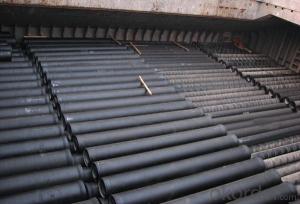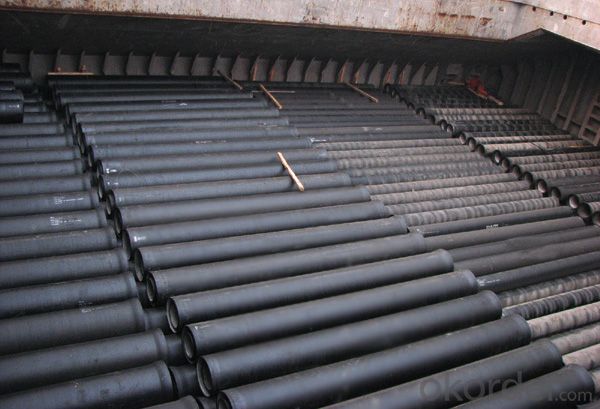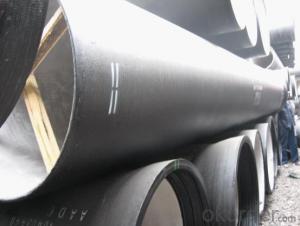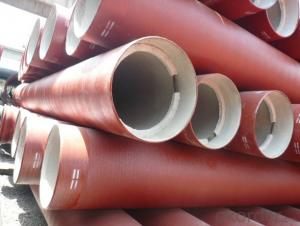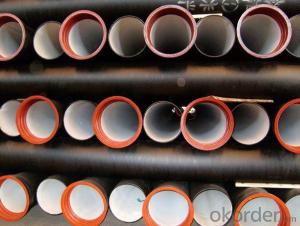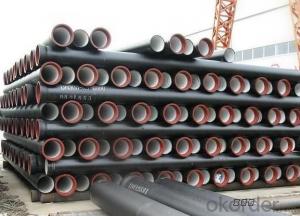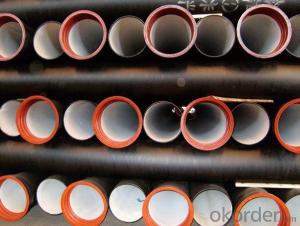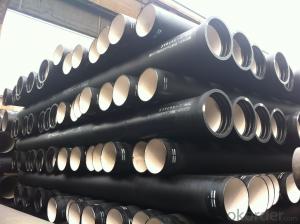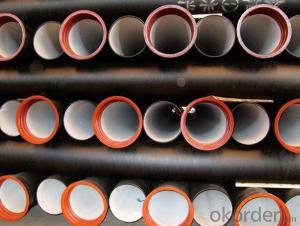Ductile Iron Pipe EN545/EN598/ISO2531 DN800 C25
- Loading Port:
- China main port
- Payment Terms:
- TT or LC
- Min Order Qty:
- 24 m.t.
- Supply Capability:
- 200000 m.t./month
OKorder Service Pledge
OKorder Financial Service
You Might Also Like
1,Ductile Iron Pipe Description :
DI pipe fittings are manufactured according to ISO 2531 or BS EN545 or BS4772 FOR POTABLE WATER ,internal is cement lining or wet epoxy coating;External is zinc plus bitumen or wet epoxy coating. We also manufacture ductile iron fittings with fusion bonded epoxy both inside and outside. All the producets are sutible to water pipes fields.We have passed ISO9001,ISO14001,OHSMS18001 certificate.
2,Main Features of the Ductile Iron Pipe:
•High yield strength
•High tensile Strength
•High corrosion resistance
•Pressure Resistence
•Anti-corrosion
•Installation is convenient
•Satisfy the highest hygienic standards
•Chemical checking
•NDE after rough machining
•Mechanical testing after heat treatment
•Full Q.A document as per client request
•Standard export package(carton/wooden case/pallet)
•Accept FOB,FAS,CNF,CIF door to door etc or customer designated shipping agent
3,Ductile Iron Pipe Images:
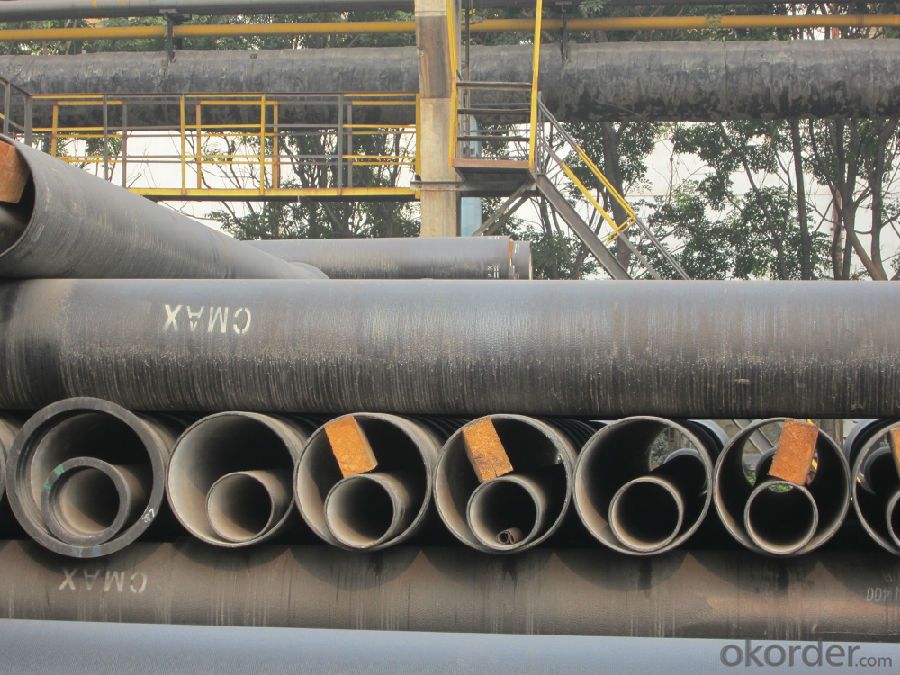
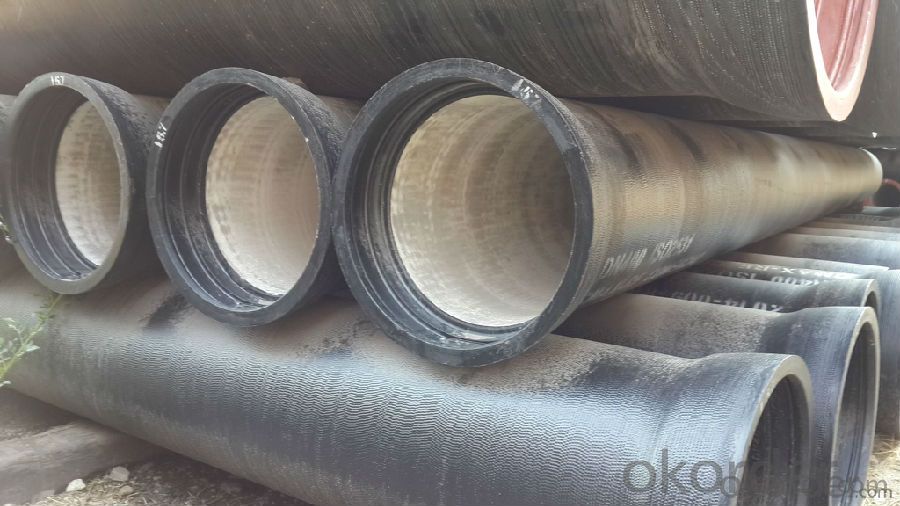
4. Ductile Iron Pipe Specification:
Standard: API SPEC 5L 44th eidtion,ASTM A252-98(2007)
Grade: A53 Grades A/B, ASTM A106 Grades B/C,ASTM A179
AWWA, C200, ASTM A139, ASTM A120, API 5L Grade B
X42, X52, X56, X60, X65, X70, X80, X100
Weld Alternatives: LSAW
OD size range: 6.4~44.5mm
Wall thickness: 406.4~1422mm
Length: 3 - 12 m according to requirment
Note: Other grade can also be provided after consulting. Special design are available
for coal slurry conveyance LSAW line tube -- Service
5.FAQ:
We have organized several common questions for our clients,may help you sincerely:
1.Q: Why would you choose ductile iron pipe rather than other pipe materials?
A:The reasons are obvious for that not only ductile iron pipe possesses the inherent strength and flexibility of ductile iron, combined with proven corrosion protection systems, but also the cost savings can be achieved from design to installation and commissioning.
2.Q:Why can you guarantee the inner of pipes can’t be corroded?
A: High alumina cement mortar lining and sulphate-resistant cement mortar lining. These two special linings are applicable to inner anti-corrosion for sewage pipes, improving resistance to erosion of the sewage components.
- Q: How do ductile iron pipes perform in high-temperature water applications?
- Ductile iron pipes perform well in high-temperature water applications due to their inherent strength and durability. They can withstand the elevated temperatures without losing their structural integrity, making them an ideal choice for conveying hot water.
- Q: Are ductile iron pipes suitable for use in chemical storage tanks?
- Ductile iron pipes are not suitable for use in chemical storage tanks. While ductile iron pipes have excellent mechanical properties, including high tensile strength and impact resistance, they are not resistant to corrosion caused by various chemicals. Chemical storage tanks require materials that can withstand the corrosive properties of the stored chemicals to ensure the safety and integrity of the tank. Therefore, materials such as fiberglass-reinforced plastic (FRP), stainless steel, or high-density polyethylene (HDPE) are commonly used for chemical storage tanks due to their superior corrosion resistance. It is crucial to select the appropriate material for chemical storage tanks to prevent leaks, contamination, and potential hazards.
- Q: Are ductile iron pipes suitable for installation in areas with high seismic activity?
- Ductile iron pipes are a suitable choice for installation in areas with high seismic activity. One of the key advantages of ductile iron pipes is their ability to withstand external loads and ground movement, making them ideal for seismic zones. Ductile iron pipes have excellent flexibility and high tensile strength, allowing them to withstand ground shifting and seismic forces without breaking or fracturing. Additionally, their high resistance to impact and stress make them less susceptible to damage during seismic events. Furthermore, ductile iron pipes have a proven track record of performance in seismic areas, as they have been successfully installed and used in earthquake-prone regions around the world for many years. They have demonstrated their ability to withstand the ground movements caused by seismic activity without compromising their structural integrity. Moreover, ductile iron pipes have the advantage of being highly durable and long-lasting, which is crucial in areas with high seismic activity where infrastructure needs to withstand frequent ground movements. Their longevity reduces the need for frequent maintenance and replacement, making them a cost-effective option in the long run. However, it is important to note that proper installation techniques and adherence to seismic design guidelines are essential to ensure the optimal performance of ductile iron pipes in high seismic areas. It is recommended to consult with experienced engineers and follow local building codes and regulations to ensure the pipes are installed correctly and can withstand the specific seismic conditions of the area. Overall, due to their flexibility, strength, durability, and proven performance, ductile iron pipes are considered suitable for installation in areas with high seismic activity.
- Q: How are ductile iron pipes protected against external soil loads?
- Ductile iron pipes are protected against external soil loads through a combination of proper installation techniques and the use of protective coatings. The pipes are installed in a manner that allows for adequate support and backfilling, which helps distribute the external soil loads evenly. Additionally, these pipes are often coated with materials such as epoxy or polyethylene to provide a barrier between the pipe and the surrounding soil, preventing corrosion and damage from external forces. This protective coating ensures the longevity and durability of ductile iron pipes in underground applications.
- Q: What are the common pressure ratings for ductile iron pipes?
- Common pressure ratings for ductile iron pipes vary depending on the specific application and industry standards. However, the most commonly used pressure ratings for ductile iron pipes are Class 150, Class 200, Class 250, and Class 350. Class 150 ductile iron pipes are typically used for low-pressure applications, with a working pressure of up to 150 psi (pounds per square inch). These pipes are commonly used for water distribution systems, irrigation, and gravity flow sewer systems. Class 200 ductile iron pipes have a higher working pressure of up to 200 psi. These pipes are often used for applications that require a slightly higher pressure, such as industrial water supply, fire protection systems, and wastewater treatment plants. Class 250 ductile iron pipes have a working pressure of up to 250 psi. These pipes are suitable for more demanding applications, such as high-pressure water supply systems, power plants, and municipal water distribution networks. Class 350 ductile iron pipes have the highest working pressure rating, with a maximum pressure of up to 350 psi. These pipes are typically used for heavy-duty applications, such as industrial water supply, oil and gas pipelines, and large-scale water transportation projects. It's important to note that these pressure ratings are general guidelines and may vary depending on the specific manufacturer and product specifications. Consulting industry standards and guidelines, as well as working with qualified engineers and professionals, is essential to ensure the correct pressure rating is selected for a particular ductile iron pipe application.
- Q: Can ductile iron pipes be used in acidic environments?
- Ductile iron pipes are capable of being utilized in acidic environments. These pipes possess a strong resistance to corrosion, rendering them suitable for a wide range of applications, including those involving acidic conditions. The heightened carbon content found in ductile iron pipes generates a shielding layer on the pipe's surface, effectively thwarting direct attacks from acid on the iron. Furthermore, the interior lining of the pipe can be coated with epoxy or other protective substances to bolster its resistance to corrosion in acidic settings. Nevertheless, it is crucial to take into account the precise concentration and type of acid present within the environment, as certain acids may still induce corrosion over time. It is highly recommended to seek counsel from professionals or manufacturers to ensure the appropriate selection of materials for specific acidic conditions.
- Q: Are ductile iron pipes suitable for installation in rocky or hard soil conditions?
- Yes, ductile iron pipes are suitable for installation in rocky or hard soil conditions. Ductile iron pipes are known for their strength and durability, making them well-suited for challenging soil conditions. Their high tensile strength allows them to withstand external loads and pressures, including the presence of rocks or hard soil. Additionally, ductile iron pipes are resistant to corrosion, which further enhances their suitability for installation in such conditions. The pipes' flexibility and ability to withstand bending stresses also make them a reliable choice for rocky or hard soil conditions, as they can accommodate ground movement without compromising their structural integrity. Overall, ductile iron pipes are a preferred option for installations in challenging soil conditions due to their robustness, longevity, and resilience.
- Q: What is the expected abrasion resistance of ductile iron pipes?
- The expected abrasion resistance of ductile iron pipes is generally high, as they are known for their durability and ability to withstand wear and tear caused by abrasion over an extended period of time.
- Q: Can ductile iron pipes be used for cooling water systems?
- Indeed, cooling water systems can utilize ductile iron pipes. Renowned for their resilience, robustness, and resistance to corrosion, ductile iron pipes are a fitting choice for various applications, including cooling water systems. With the ability to withstand high pressure and temperature fluctuations, these pipes excel in circulating and transporting cooling water. Moreover, their smooth interior surface mitigates friction, diminishing the likelihood of scaling or blockages and enabling the efficient flow of cooling water. Consequently, ductile iron pipes emerge as a dependable and efficient option for cooling water systems.
- Q: How much pressure can the ductile iron pipe socket meet?
- If it is a general installation, you can rest assured, are within the scope of tolerance.
Send your message to us
Ductile Iron Pipe EN545/EN598/ISO2531 DN800 C25
- Loading Port:
- China main port
- Payment Terms:
- TT or LC
- Min Order Qty:
- 24 m.t.
- Supply Capability:
- 200000 m.t./month
OKorder Service Pledge
OKorder Financial Service
Similar products
Hot products
Hot Searches
Related keywords
